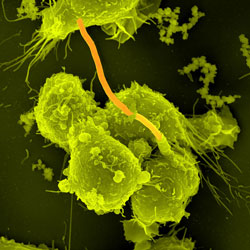Mar 15 2005
 |
| Scanning electron micrograph of macrophages infected with Bacillus anthracis - Image: Max Planck Institute for Infection Biology |
The anthrax attacks in the aftermath of September 11, 2001 in the USA have illustrated the high potential of anthrax for misuse in bio-terrorism. Dissemination of anthrax by letters led to the death of 5 people and chemotherapeutic treatment of 30,000 individuals.
Now the Max Planck team of Stefan H.E. Kaufmann, his PhD student Chun Kim and co-workers have developed a new therapeutic strategy against anthrax. In preclinical studies, these scientists showed that defensins neutralize the lethal toxin of anthrax bacilli and thus can prevent its deadly effect. Whilst defensins are well known to kill bacteria, toxin neutralization represents a novel function of defensins.
Defensins are capable of perforating the bacterial cell wall thus killing bacterial pathogens. Accordingly, their antibiotic potential is currently exploited although it is not clear when new chemotherapeutic agents on the basis of defensins will be available. The researchers, however, hope that a drug against anthrax toxin can be ready for human use within the next years.
Anthrax causes an infectious disease mostly in pigs, cattle, horses, sheep and goats. The disease is rare in humans and occurs primarily in regions with intensive farming. The lethal toxin (LeTx) composed of the lethal factor (LF) and the protective antigen (PA) is mostly responsible for the high mortality of anthrax. Although Bacillus anthracis can be treated by antibiotics, this chemotherapy frequently fails, in particular if not initiated immediately after infection, because even after eradication of the pathogen, bacterial toxins can remain in the circulation. "For this reason, new intervention strategies are urgently needed", says Stefan H.E. Kaufmann.